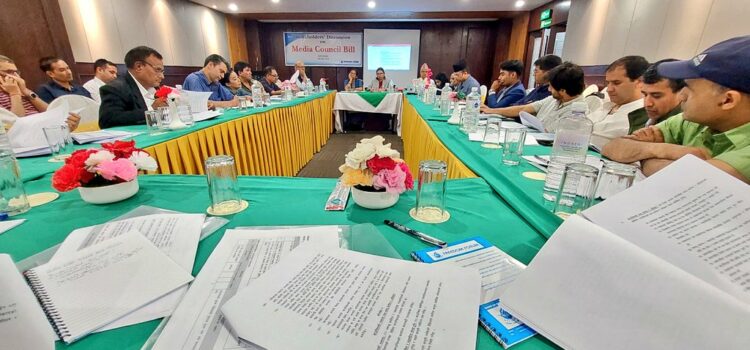Amendment on Bill underscored
Freedom Forum held a multi-stakeholder discussion on ‘Media Council Bill’ which is under consideration in the Legislative Management Committee of the National Assembly, the upper house of federal parliament. The event was held in the federal capital city on July 30. The discussion gathered around 40 persons from diverse sectors representing parliament, media, academia, civil society organizations and law.
Most of the participants who spoke on the occasion underlined the need for amending the Bill to make it timely and contextual, while the present lawmakers from the Upper House, assured to pay heed to the concerns and vowed amendment.
The discussion was held to highlight the faults in Bill and points to be amendment . The Bill was registered at the National Assembly on April 25, 2024.
Freedom Forum’s General Secretary Sanjeeb Ghimire welcomed the participants and spoke on the program objectives. The Bill is important not only for media practitioners but also for media consumers, he reminded, adding that the event would throw light on major issues and seek views from cso and media on it.
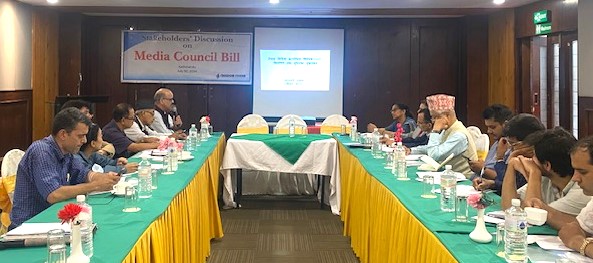
Following General Secretary Ghimire, Executive Chief Taranath Dahal stressed that the program was important to reinforce discussion on Media Council Bill in the context of new government formation. He informed the attendants that FF’s suggestions were also incorporated in lawmakers’ amendment in the Bill.
Dahal shared a brief presentation on the background and objectives of the Bill. He said more clarity was required in few provisions as on independent journalist and dignified journalism. The Bill lacks structural autonomy of the Media Council and is also not clear about appointment of chairperson and members. Moreover, it provides the council authority to regulate the social network which, actually, is beyond the council’s jurisdiction because it is assigned to regulate journalistic contents only.
The proposed Media Council should be accountable to parliament and the Bill should have approach of building media credibility rather than restricting media rights.
On the occasion, media researcher Ujjwal Acharya seconded Dahal, saying while this revised Bill addressed few concerns in comparison to the previous one, some provisions on it do not guarantee independence of the proposed Media Council. The council should be independent, autonomous and acceptable to media industry. He specifically mentioned that Section 20.4.4 which states that the press identity card of journalists will be suspended for a year if he/she is found violating code of conduct. It must be removed, he demanded.
Advocate Pabitra Raut reminded the lawmakers whether they kept in mind existing provision for press freedom while formulating the Bill. Our lawmaking process is principally narrow which restricts international standards for freedom of expression and speech. She also showed her concern towards not paying attention to federal context.
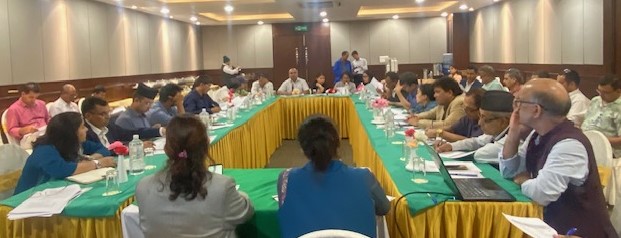
Reporter at the Nagarik daily, Tapendra Karki, also stressed that Section 6 of the Bill delegates authority to the concerned ministry’s secretary and joint secretary which is against the norms of freedom of expression. The Bill is also ambiguous about reporting mechanism. Who is the Media Council accountable for? He wondered.
General Secretary of Nepal Press Union, Dilip Paudel, argued that the Media Council seems to be state-controlled as per the provision on the Bill. The appointment process involving government draws concern and is biased.
Researcher Umesh Pokharel said that the introduction section of the Bill for ‘online journalism’ should also look after the ‘comments’ posted on the online media. The Bill should also be made clear in context to source of funding to the council.
Advocate Shyam Kumar Khatri argued that the council’s structure seems to depict the Panchayat system of Nepal. The council’s chairperson should be one from among the veteran journalists rather than judge.
Narayan Kafle, a reporter from the Gorkhapatra daily said that Section 18.2 is also unclear on the type of business of media and journalists.
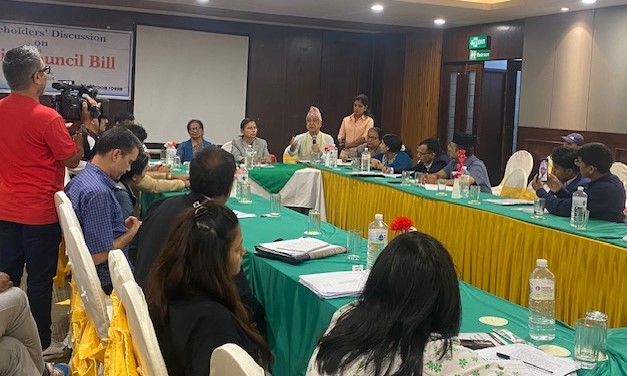
Chairperson at Media Action Nepal Laxman Datt Pant pointed that state can neither determine independence of media nor interfere with its self-regulation. We should also note that media owner’s protection is also journalists’ protection. Moreover, Section 25 speaks about financial donation which is vague. If any media is funded by the state, it will be more biased and government-controlled, according to him.
Bhumi Raj Chapagain, Program Director at Sharecast Initiatives, said that the Bill is more control-oriented, so it fails to reward and encourage the journalists. In section 5.4 of the Bill, more clarity is needed on what should be done or it should be removed, he said adding, the Bill looks much bureaucratic .
Journalist from Humla, Karnali Province, Nabaraj Mahatara also expressed his concern upon appointment process and accountability of the media council. He asked the lawmakers be aware that the code of conduct may be different for a radio and an online media. Similarly, code of conduct for a media operating in Humla may be different than those operating in Kathmandu.
Chairperson at Sancharika Samuha, Bimala Tumkhewa, claimed that the Bill should explicitly mention appointment of women member and staff in the council’s structure.
Senior journalist Namrata Sharma added that the provisions critical to freedom of press must be deleted from the Bill.
News editor at Nepal Television, Saloja Dahal, marked that the Bill should be prepared in context to the federalism. Moreover, section 7.2 about qualification of the council members should also include ‘moral behavior’ of the members. Section 21.2 about reconciliation among journalists and complainants should be more clear on ways for reconciliation.
Advocate Man Bahadur Lamichhane said that self-regulation of media should be promoted and the regulations of the council should be in multiple languages.
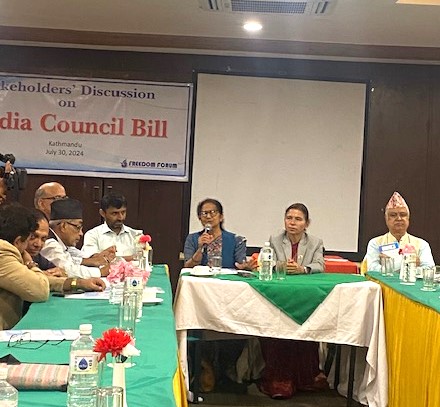
Media researcher Devraj Humagain stressed that section 7.2 should not be deleted from the Bill as it speaks about discipline and behavior of the members. He further claimed that the council will not be autonomous if controlled by the ministries. In case of complaints, the time limit for adjudication process should also be mentioned, he said.
Editor at www.technologykhabar.com, Anujraj Dhungel, asked who would regulate the contents published on social media such as YouTube and news aggregation sites such as Hamro Patro. “How can citizen journalism be guided and monitored?”, he questioned. Also, introduction on media organization should be clear to differentiate online and mass media. Section 17 about self- regulation is vague, he observed.
Chief Monitoring Officer at Press Council Nepal, Jhabindra Bhusal, said that the Bill should address news producers and social media pages operated by the registered media. Similarly, the council should establish its contact offices in all the seven provinces. Section 25.2.1 dealing with financial autonomy should also be reviewed, he noted. He made it clear that Council would not monitor social media pages of non-journalistic media.
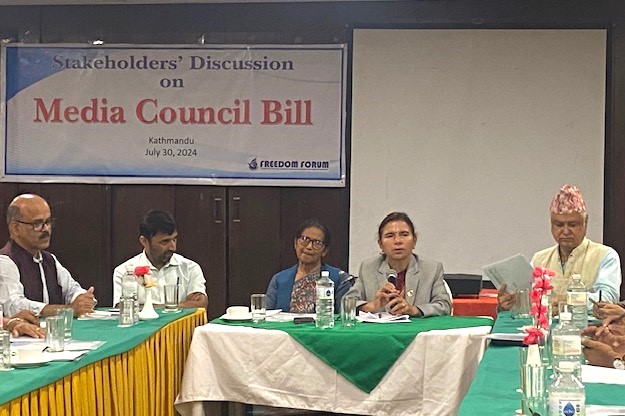
Chairperson at ACORAB Arjun Giri also said that the Bill should be in line with the federal structure. He worryingly said that he does not see good future of implementation of the Bill.
Senior Joint Secretary at National Human Rights Commission (NHRC), Yagya Adhikari, commented that the Bill lacked gender inclusion, and financial and functional autonomy of the council. Definition of ‘journalist’ should also be widened and control mechanism in the Bill should be wiped out, he emphasized.
Noted journalist and President of Nepal Press Institute, Tirtha Koirala, marked that today’s media lacks trust and credibility rather than discipline. The Bill should not be passed without proper consultation; consultation is required even with the Bill drafters. The Bill should also define the landscape- ‘which particular agency’ is responsible for conducting training and which for conducting monitoring and regulation. It should also have clear provisions on whether content producers or platform should be punished for violating code of conduct.
Responding to all comments, Honorable Lawmaker in the National Assembly and Member of the Legislative Management Committee, Narayan Datta Mishra, stated that all the members in Legislative Management Committee were unified to remove issues incongruent to the preamble of the Bill and even the ministers had vowed press freedom. He also assured that only veteran journalists with good conduct would be appointed in the council.
Honorable Lawmaker Ganga Kumari Belbase addressed the participants’ comments, saying issues of both regulation and independence of the council would be ensured in the Bill. “We are also deeply studying how to prepare the media friendly Bill. We will try our best to ensure ownership of all concerned sides to the Bill”, she confirmed.
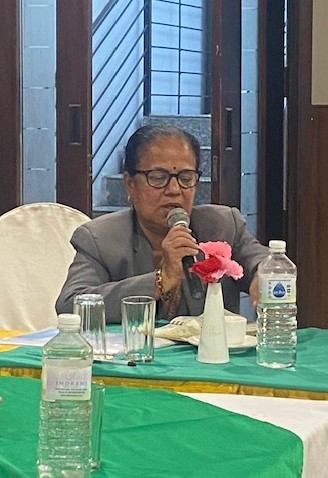
Next, Honorable Lawmaker and Legislative Management Committee Member, Tulasha Kumari Dahal shared that the Bill would be approved unanimously so that it would not be biased. She acknowledged the participants’ view that the Bill’s preamble ensured autonomy of the Media Council whereas latter part was control-oriented. “The committee is preparing a balanced proposal on the Bill, so we are ready to make the Bill acceptable to all concerned sectors,” she shared.
Moreover, Honorable Lawmaker Kamala Pant informed that the committee members themselves were freedom fighters. Therefore, all the suggestions brought forth in the discussion would be addressed to make the Bill effective, she believed. Any provisions unclear and undefined would be removed to make the Bill acceptable and FoE-friendly, she reminded.
Concluding the discussion, FF’s Chairperson Hari Binod Adhikari expressed gratitude to Honorable Lawmakers and Members of the Legislative Management Committee under the National Assembly for pledging correction in Bill so that it would be in favor of press freedom and freedom of expression. Let’s hope that the Bill would be improved and approved with formation of autonomous and media friendly Media Council which further contributes to free, fair and sustainable journalism and media, he added.
The program witnessed participation of 46 participants including 12 female.
#MediaCouncilBill #MediaCouncil

